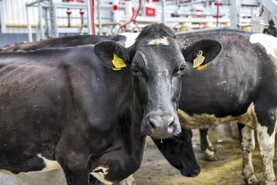The April rush of annual results has come from the major milk processors around the country. This week, Lorcan Roche Kelly outlines the Tirlán numbers.
It’s a big month for all co-op shareholders and milk suppliers as they hear how 2023 went in financial terms, and any plans in the pipeline for 2024 and beyond.
As a farmer in a co-op, it is one of the benefits of having a shareholding in a business and a direct route through elected directors into co-op management.
Across Europe, many farmers supply milk to businesses that operate as a private entity, and they have no say in how or what that company does.
Last week Ornua (formerly the Irish Dairy Board) announced annual results. Eight of the Irish co-ops have a shareholding in Ornua and a big part of its remit is to sell butter and other dairy products, under the one name or brand called ‘Kerrygold’ on international markets.
The intention is not to undermine the value of the product sold by Irish companies competing with each other on the international stage. It is over six years since Glanbia Co-op (now Tirlán) launched Truly Grass Fed butter and cheese products into the US, where Kerrygold is very strong.
At the time, the reasoning from Tirlán to launch into the US was that their butter wasn’t going to compete directly with Kerrygold.
Tirlán management said their directors were mandating them to deliver the best returns they could for their product.
The suggestion was that it was going to be sold as a price premium above Kerrygold, to a more sophisticated consumer, because of higher animal welfare standards, and a few other unique differentiators to Kerrygold.
Subsequently in 2021, another Ornua member, Dairygold co-op in a tie-up with their partners TINE from Norway started selling Irish cheese through the Pastureland brand in North America.
This week we learn Lakeland, another part owner of Ornua, is now looking to sell grass-fed Irish butter through a tie-up with Vitality Farms in North America.
Competition
So what does all this mean? It means Kerrygold has external and internal competition. We understand companies such as the Chinese-owned, Westland products from New Zealand, are seeking grass-fed butter market share in the US.
Now Ornua has another of its own members offering product similar in nature into the same market. Who wins? American retailers and consumers win as they get discounted product because the market leaders such as Kerrygold have to go on promotion to hold market share.
So then we get back to the same old merry-go-round of where does the responsibility lie – to farmers, their co-op or to Ornua? Directors will say they have a fiduciary duty to their co-op and have to do what is best for their co-op and shareholders.
The farmers and directors of these co-ops have to take responsibility on this. Essentially by all competing in the same market, they could be eroding any premium for Kerrygold.
So when co-op management presents opportunities like this to directors, the key questions are – will this business plan stand up, what sales are expected, and, what is the cost of investing in the brand in the US?
Directors then have to follow up on those questions again and again, year after year, and see if the business case stands up.
This week Sean Molloy (the CEO designate for Tirlán) said Ornua is an important customer of Tirlán’s and that he has a healthy respect for Ornua.
That might well be the case. Do Tirlán directors or shareholders know the answer to this question: has Truly Grass Fed worked in the US? Our market information suggests that the Truly Grass Fed brand is selling to consumers at about 25% below Kerrygold value.
Destroying value
If that is true, is the original premise of premium price and the alternative consumer to Kerrygold still the strategy and how is Tirlán executing that strategy? Are they only destroying value and dragging down Kerrygold to compete on promotions in certain supermarkets?
Will the new CEO of Ornua, Conor Galvin, formerly CEO of Dairygold, have the same appetite for competing brands when he sits in the Ornua hot seat? Now that former Ornua executive, now Lakeland CEO Colin Kelly looks to be taking on his former employers in the US, another fox has entered the hen house.
Soon there are going to be more foxes than hens in the hen house, and ultimately Irish milk suppliers will lose out.
The sad thing is the reset of the Ornua governance structure with more so-called independent directors appointed doesn’t seem to have helped this particular long-running battle.






 This is a subscriber-only article
This is a subscriber-only article










SHARING OPTIONS: